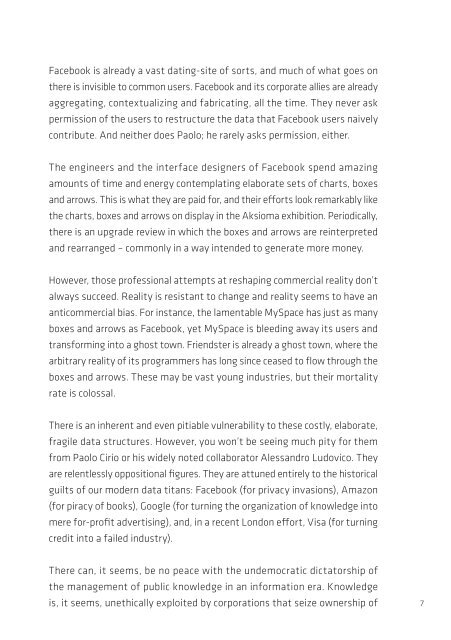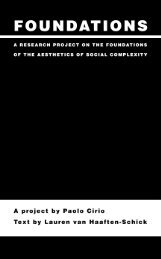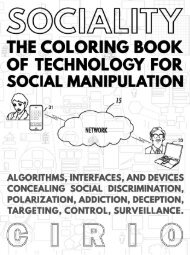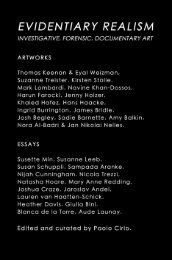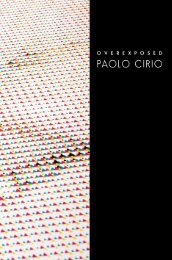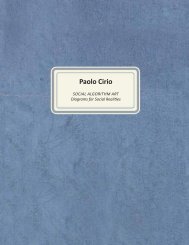REALITYFLOWHACK, Catalog CIRIO's show at Aksioma Institute for Contemporary Art, 2011
REALITYFLOWHACKED, Paolo Cirio's solo show at the Institute for Contemporary Art, Ljubljana, 2011. Critical text by Bruce Sterling.
REALITYFLOWHACKED, Paolo Cirio's solo show at the Institute for Contemporary Art, Ljubljana, 2011. Critical text by Bruce Sterling.
You also want an ePaper? Increase the reach of your titles
YUMPU automatically turns print PDFs into web optimized ePapers that Google loves.
Facebook is already a vast d<strong>at</strong>ing-site of sorts, and much of wh<strong>at</strong> goes on<br />
there is invisible to common users. Facebook and its corpor<strong>at</strong>e allies are already<br />
aggreg<strong>at</strong>ing, contextualizing and fabric<strong>at</strong>ing, all the time. They never ask<br />
permission of the users to restructure the d<strong>at</strong>a th<strong>at</strong> Facebook users naively<br />
contribute. And neither does Paolo; he rarely asks permission, either.<br />
The engineers and the interface designers of Facebook spend amazing<br />
amounts of time and energy contempl<strong>at</strong>ing elabor<strong>at</strong>e sets of charts, boxes<br />
and arrows. This is wh<strong>at</strong> they are paid <strong>for</strong>, and their ef<strong>for</strong>ts look remarkably like<br />
the charts, boxes and arrows on display in the <strong>Aksioma</strong> exhibition. Periodically,<br />
there is an upgrade review in which the boxes and arrows are reinterpreted<br />
and rearranged – commonly in a way intended to gener<strong>at</strong>e more money.<br />
However, those professional <strong>at</strong>tempts <strong>at</strong> reshaping commercial reality don’t<br />
always succeed. Reality is resistant to change and reality seems to have an<br />
anticommercial bias. For instance, the lamentable MySpace has just as many<br />
boxes and arrows as Facebook, yet MySpace is bleeding away its users and<br />
trans<strong>for</strong>ming into a ghost town. Friendster is already a ghost town, where the<br />
arbitrary reality of its programmers has long since ceased to flow through the<br />
boxes and arrows. These may be vast young industries, but their mortality<br />
r<strong>at</strong>e is colossal.<br />
There is an inherent and even pitiable vulnerability to these costly, elabor<strong>at</strong>e,<br />
fragile d<strong>at</strong>a structures. However, you won’t be seeing much pity <strong>for</strong> them<br />
from Paolo Cirio or his widely noted collabor<strong>at</strong>or Alessandro Ludovico. They<br />
are relentlessly oppositional figures. They are <strong>at</strong>tuned entirely to the historical<br />
guilts of our modern d<strong>at</strong>a titans: Facebook (<strong>for</strong> privacy invasions), Amazon<br />
(<strong>for</strong> piracy of books), Google (<strong>for</strong> turning the organiz<strong>at</strong>ion of knowledge into<br />
mere <strong>for</strong>-profit advertising), and, in a recent London ef<strong>for</strong>t, Visa (<strong>for</strong> turning<br />
credit into a failed industry).<br />
There can, it seems, be no peace with the undemocr<strong>at</strong>ic dict<strong>at</strong>orship of<br />
the management of public knowledge in an in<strong>for</strong>m<strong>at</strong>ion era. Knowledge<br />
is, it seems, unethically exploited by corpor<strong>at</strong>ions th<strong>at</strong> seize ownership of<br />
7


